Related Research Articles
Glam rock is a style of rock music that developed in the United Kingdom in the early 1970s and was primarily defined by the flamboyant clothing, makeup, and hairstyles of its musicians, particularly platform shoes and glitter. Glam artists drew on diverse sources across music and throwaway pop culture, ranging from bubblegum pop and 1950s rock and roll to cabaret, science fiction, and complex art rock. The flamboyant clothing and visual styles of performers were often camp or androgynous, and have been described as playing with other gender roles. Glitter rock was a more extreme version of glam rock.
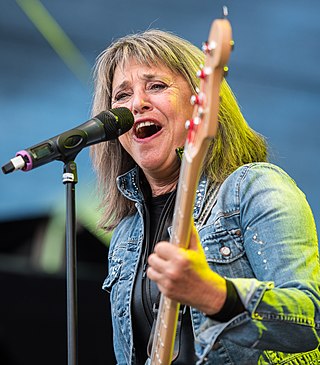
Susan Kay Quatro is an American singer, bass guitarist, songwriter and actor. In the 1970s, she scored a string of singles that found success in Europe and Australia, with both "Can the Can" (1973) and "Devil Gate Drive" (1974) reaching No. 1 in several countries.

Roy Wood is an English musician, singer and songwriter. He was particularly successful in the 1960s and 1970s as member and co-founder of the Move, Electric Light Orchestra and Wizzard.
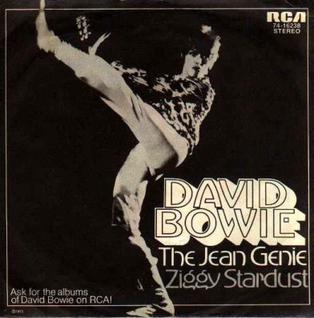
"The Jean Genie" is a song by the English singer-songwriter David Bowie, originally released in November 1972 as the lead single to his 1973 album Aladdin Sane. Co-produced by Ken Scott, Bowie recorded it with his backing band the Spiders from Mars − comprising Mick Ronson, Trevor Bolder and Mick Woodmansey. According to Bowie, it was "a smorgasbord of imagined Americana", with a protagonist inspired by Iggy Pop, and the title being an allusion to author Jean Genet. One of Bowie's most famous tracks, it was promoted with a film clip featuring Andy Warhol associate Cyrinda Foxe and peaked at No. 2 on the UK Singles Chart.

Neil Sedaka is an American singer, songwriter and pianist. Since his music career began in 1957, he has sold millions of records worldwide and has written or co-written over 500 songs for himself and other artists, collaborating mostly with lyricists Howard "Howie" Greenfield and Phil Cody.

"Rebel Rebel" is a song by the English singer-songwriter David Bowie. It was released in the UK on 15 February 1974 by RCA Records as the lead single from the album Diamond Dogs. Written and produced by Bowie, the song is based around a distinctive guitar riff reminiscent of the Rolling Stones. Cited as his most-covered track, "Rebel Rebel" has been described as Bowie's farewell to the glam rock movement that he had helped initiate, as well as being a proto-punk track. Two versions of the song were recorded: the well-known UK single release and the shorter US single release, which featured added background vocals, extra percussion and a new arrangement.

"Drive-In Saturday" is a song by the English musician David Bowie from his 1973 album Aladdin Sane. It was released as a single a week before the album and, like its predecessor "The Jean Genie", became a Top 3 UK hit.

"Some Girls" is a song by English singer Rachel Stevens from the 2004 reissue of her debut studio album, Funky Dory (2003). It was written by Richard X and Hannah Robinson, and produced by the former, with additional production from Pete Hoffman. It was also included on Stevens' second studio album, Come and Get It (2005). The song's music features a schaffel beat influenced by glam rock, and its lyrics describe a pop singer who performs sexual favours in her efforts to achieve stardom.
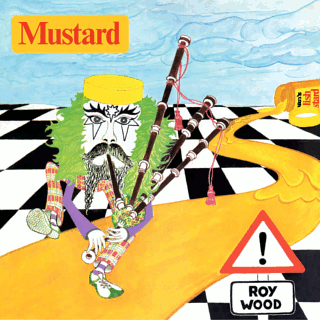
Mustard is the second solo album by English musician Roy Wood, released in December 1975 by Jet Records. The album was recorded at De Lane Lea Studios and Phonogram Studios, although a dispute at one of the studios delayed the release of the album. Produced and entirely performed by Wood, who also designed the album artwork, Mustard was a departure from his previous solo album Boulders (1973), with a more ambitious approach and denser, more layered production, again mixing a number of musical styles. Annie Haslam and Phil Everly contributed guest vocals to the album; Wood's influences on the record included the Andrew Sisters, the Beach Boys and Led Zeppelin.

Boulders is the debut solo album by English musician Roy Wood, recorded from 1969 to 1971 and released in July 1973 by Harvest Records. Wood began work on the album as a whimsical side-project away from his band the Move, and conceived it to explore numerous instruments he had collected in the 1960s but felt unable to use in the Move. Nonetheless, its release was delayed for several years due to his busy schedule with the Move, Wizzard and the Electric Light Orchestra. Apart from harmonium on one song played by John Kurlander, all the instruments on the album, including guitars, cello, saxophones, bouzouki, banjo and recorders, were played by Wood, who also wrote, arranged, and produced the whole record, in addition to providing all the vocals. The musician also painted the unfinished self-portrait on the cover.
"See My Baby Jive" is a 1973 song by the British glam rock band Wizzard.

"Solitaire" is a ballad written by Neil Sedaka and Phil Cody. Cody employs playing the card game of solitaire as a metaphor for a man "who lost his love through his indifference"—"while life goes on around him everywhere he's playing solitaire". The song is perhaps best known via its rendition by Carpenters. Another version by Andy Williams reached number 4 in the UK Singles Chart in 1973.
"Love Will Keep Us Together" is a song written by Neil Sedaka and Howard Greenfield. It was first recorded by Sedaka in 1973. The brother-sister duo Mac and Katie Kissoon also recorded a version in 1973. American pop duo Captain & Tennille covered it in 1975, with instrumental backing almost entirely by “Captain” Daryl Dragon, with the exception of drums played by Hal Blaine; their version became a worldwide hit.

"I Wish It Could Be Christmas Everyday", sometimes written as "I Wish It Could Be Christmas Every Day", is a Christmas song recorded by British glam rock band Wizzard. It was first released in December 1973 and, as with most Wizzard songs, was written and produced by the band's frontman Roy Wood—formerly of The Move and a founding member of Electric Light Orchestra. Despite the song's strong, long-lasting popularity, it has reached no higher than number four on the UK Singles Chart, a position it occupied for four consecutive weeks from December 1973 to January 1974. The song was beaten to the 1973 Christmas Number 1 spot by Slade's "Merry Xmas Everybody", which remained at the top of the charts for five weeks, from December 1973 to January 1974.
"Fire Brigade" is a song written by Roy Wood and performed by The Move. Released as the group's fourth single in Britain in February 1968, it reached No. 3 in the UK Singles Chart. A cover version was recorded by The Fortunes and released as a single in the US, but did not chart.
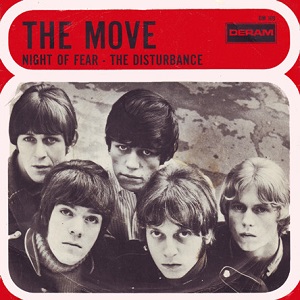
"Night of Fear" is the debut single by British rock band the Move, written by Roy Wood. The song was first released on 9 December 1966, and reached number 2 in the UK Singles Chart on 26 January 1967, staying for ten weeks in the charts. "Night of Fear" was the first of a string of four consecutive top-five singles in the UK.
The Glitter Band are a glam rock band from England, who initially worked as Gary Glitter's backing band under that name from 1973, when they then began releasing records of their own. They were unofficially known as the Glittermen on the first four hit singles by Gary Glitter from 1972 to 1973.
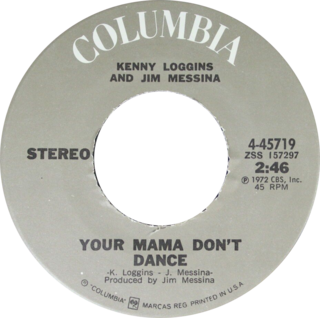
"Your Mama Don't Dance" is a hit 1972 song by the rock duo Loggins and Messina. Released on their self-titled album Loggins and Messina, it reached number four on the Billboard pop chart and number 19 on the Billboard Easy Listening Chart as a single in early 1973.

"I Am Not a Robot" is a song by Welsh singer Marina Diamandis, released under the stage name Marina and the Diamonds, from her debut studio album, The Family Jewels (2010). It was released digitally on 23 April 2010 and physically on 26 April 2010 as the album's third single. The track originally appeared on Diamandis's second extended play, The Crown Jewels EP (2009). The single was added to BBC Radio 1's A List in April 2010. A choral version of "I Am Not a Robot" was used in an advertisement for British healthcare provider Bupa in March 2011. Additionally, the song was heavily sampled by American rapper Hoodie Allen for his debut single "You Are Not a Robot" (2010).
"Rock 'n' Roll Winter " was a song written by Roy Wood. It was released by the British rock band Wizzard, as their first single on the Warner Bros label in 1974. It was originally meant to be issued early in 1974 but the date was pushed back to 29 March 1974, before it was finally released on 19 April that year. Nevertheless, it sold well and reached number 6 on the UK Singles Chart, and number 13 on the Irish Singles Chart.
References
- ↑ Strong, Martin C. (2000). The Great Rock Discography (5th ed.). Edinburgh: Mojo Books. p. 674. ISBN 1-84195-017-3.
- ↑ "Forever / Music to Commit Suicide By by Roy Wood". Rateyourmusic.com. Retrieved 27 August 2019.
- ↑ "Roy Wood - Forever - 7" Single - Atlas Records". Atlasrecords.co.uk. Retrieved 27 August 2019.
- 1 2 Roberts, David (2006). British Hit Singles & Albums (19th ed.). London, England: Guinness World Records Limited. p. 610. ISBN 1-904994-10-5.
- ↑ "Roy Wood - The Enigmatic Wizard of Rock. (Tom Bates Derbyshire Peak District Author, Writer, Poet)". Aboutderbyshire.co.uk. Retrieved 27 August 2019.
- ↑ "Billboard". 9 February 1974. p. 43.
- ↑ Petridis, Alexis (November 8, 2016). "Britain's lost pop genius: the glam rocker who hated being in the spotlight". Theguardian.com. Retrieved 27 August 2019.
- ↑ "Roy Wood - Forever". Discogs.com. 16 November 1973. Retrieved 27 August 2019.
- ↑ "The Television & Radio Database - Top of the Pops". tvrdb.com.
- ↑ "Forever - Roy Wood | Song Info". AllMusic . Retrieved 27 August 2019.
- ↑ "Singles - Roy Wood | Songs, Reviews, Credits". AllMusic . Retrieved 27 August 2019.
- ↑ "BBC Radio 2 - The Record Producers, Roy Wood, Episode 2". Bbc.co.uk. Retrieved 27 August 2019.
- ↑ "Through the Years: The Best of Roy Wood - Roy Wood | Songs, Reviews, Credits". AllMusic . Retrieved 27 August 2019.
- ↑ Petridis, Alexis (8 November 2016). "Britain's lost pop genius: the glam rocker who hated being in the spotlight". The Guardian. Retrieved 13 August 2022.
- ↑ Kent, David (1993). Australian Chart Book 1970–1992 (illustrated ed.). St Ives, N.S.W.: Australian Chart Book. p. 343. ISBN 0-646-11917-6.